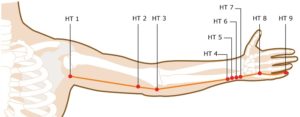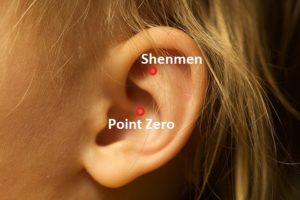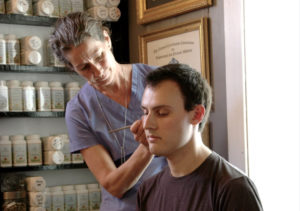F2: Bless Your Heart
BLESS YOUR HEART
“If the spirit is at peace, the heart is in harmony; when the heart is in harmony, the body is whole; if the spirit becomes aggravated the heart wavers, and when the heart wavers the body becomes injured; if one seeks to heal the physical body, therefore, one needs to regulate the spirit first.”
~ Liu Zhou, a 6th century Chinese philosopher.
Every organ in our bodies has functions and responsibilities. Some are physical while others are psychological and spiritual. The fire element, which peaks during the summer season, governs the HEART as well as the small intestine, pericardium, and triple burner. In Chinese medicine, the heart is considered the ruler or empress/emperor of all the other organs. The emotion of joy is associated with fire and when the heart is in balance, it manifests as joy and an enthusiasm for life; while out of balance, it may present as anxiety, depression, emotional coldness or hatred.
Even in our modern society with a focus on Western medicine, we refer to the heart as an organ of feeling and emotion by saying someone has a “broken heart”, knowing something “by heart”, “pulling on our heartstrings” and being “wholehearted”, “coldhearted” or “heartfelt”. And of course, as we say in the South~ “bless your heart” and “bless their heart”. These common phrases speak to an emotional organ instead of a muscle that only pumps blood.
Joy and Hatred
General symptoms of a heart imbalance may include excess or lack of laughter, emotional coldness and even hatred, reddish/ruddy complexion or a pale face, speech problems, social awkwardness, depression, mental illness, memory loss, poor circulation, weak spirit, and heat intolerance. Fire heats up the blood and organs and too much heat in our bodies, particularly the heart, causes edginess, anxiety, insomnia, headaches, and high blood pressure. The tongue is an indicator of heart healt with a red tip suggesting excess heat or deficiency heat flaring upward. Interestingly, incessant talking, inappropriate laughter, stuttering and an inability to speak also indicate a heart imbalance. People with healthy hearts are usually friendly, humble, and have a strong sense of mental clarity and propriety.
The circulation and balance of energy throughout the entire meridian system generates optimum health.
The meridian system, a fundamental concept of Chinese medicine, directs the flow of energy along specific pathways throughout the body much like the circulatory system transports blood. When this energy, also known as the life force, or qi (chi), becomes blocked or out of balance, health issues and disease occur. The concept of yin and yang helps us to understand the meridian system, which is subdivided into yin and yang groups. Twelve primary meridians are laterally and symmetrically distributed along the entire body. Six meridians, three yin and three yang, traverse each side of our bodies and these meridians connect all major organ systems. The six yin meridians run along the inner side of the body’s limbs, on the chest and abdomen; while the yang meridians run along the outer side of the limbs and along the head, face, and torso. Each meridian plays a specific and critical role in the health of the entire body.
The heart meridian is relatively short with only nine acupuncture points. The heart meridian starts in the middle of the arm pit, goes down the inside of the arm, to the tip of the pinky finger. The heart meridian is also known as the Hand Shao Yin Meridian, which is connected to the Foot Shao Yin Meridian, the kidneys meridian. The heart represents the fire in the body and the kidneys are water, thus, creating a relationship in our bodies between the heart and kidneys. See upcoming winter posts for more about the kidneys.
An example of common acupuncture points used on the heart meridian include:
HT-3- clears mucus and heat from the heart
HT-6- helps with night sweats and tones the heart blood
HT-7- The most commonly used point along the heart channel, it is used to treat insomnia, heart imbalances, palpitations, emotional distress, and memory and focus issues. The Shen Men ear point (discussed below) functions in much the same way as the HT-7 point.
GET HEART HEALTHY!
Exercises that stretch and strength the arms are recommended for heart health because the heart meridians start in the armpit and extend along the inside of the arm. You can also try a simple exercise of clenching and relaxing your fists! Sit up straight and allow your arms to hang comfortably between your legs. Take even and slow breathes while slowly making fists with your hands. Clench your fists while exhaling and vocalizing the sound of the heart in the back of the throat: haaaaw. Loosen fists and relax deeply when inhaling. Repeat at least 8 times. This simple exercise stimulates blood flow and activates the heart meridian.
Reverse Heart Disease with Ornish Lifestyle Medicine
The Ornish Lifestyle Medicine program was developed by world renowned cardiologist, Dr. Dean Ornish, the founder and president of the non-profit Preventive Medicine Research Institute and Clinical Professor of Medicine at the University of California, San Francisco.
Dr. Ornish is the first physician to prove with scientific evidence that heart disease can be reversed by natural methods, including specific dietary and lifestyle changes. Ornish’s program consists of an ultra-low fat diet, yoga, meditation , therapy/support groups, and no smoking. The Ornish diet reduces blood cholesterol levels and reverses atherosclerosis, or obstruction of the arteries, making it a highly effective therapy for treating and preventing heart disease, strokes, high blood pressure, and high cholesterol. The Ornish diet is also a successful weight loss program.
The closest medical provider or facility that uses Ornish Lifestyle Medicine is the St. Dominic-Jackson Memorial Hospital in Jackson, Mississippi. Follow this link for more information about the Ornish program at St. Dominic.
Check out Dr. Ornish talking about reversing heart and lifestyle diseases below.
The Shen
The heart and associated meridian not only control blood circulation but also control our emotional and spiritual realms of consciousness, sleep, memory, and our minds. In Western medicine, we usually think of the heart as an organ that pumps blood, however, in Chinese medicine, the heart is the organ system that houses the Shen. The Shen is defined as our spirit, mind, consciousness or awareness. Some people compare Shen to the “spirit”. All the spiritual aspects of the organs are called ‘the five Shen’ in Chinese medicine, each representing different aspects of our consciousness.
The Shen of the Heart is an awareness of oneself and living in the moment. It is virtuous. The heart must be at peace and absent of any distressing emotions in order to possess the Shen. The health of a person’s heart is reflected in their face and a person’s eyes reflect their spirit, or Shen.
Maybe most important for heart health is a focus on reducing stress and fostering joy. A joyful and happy life leads to a healthy heart and body. For a quick and effective stress reliever, I use a simple treatment of Point Zero (also known as Point Wonderful) and Shen Men, a point on the ear that translates to “Gateway to Heaven” or “Spirit Gate”. Shen Men is located at the apex of the triangular fossa region (the upper mid center of the ear, just above the opening canal and the surrounding concentric folds) of the ear. Used in treating almost any health condition, pressing this point helps to relieve stress, anxiety, allergies, headaches, addiction, inflammation, depression, and pain. Shen Men is similar to the HT 7 acupuncture point along the heart meridian.
I also like to send patients home with “acupuncture to go” tiny, stainless steel balls (originally perilla seeds) taped at Shen Men with instructions to press the seeds multiple times per day. Simply having the ‘seeds’ set in the ear provide light pressure and activate the heart via the holographic representation of the body on the ear. My patients love this simple tool for decompressing at home and for busy times on the go! In the clinic we have taught many folks to apply these points at home. We are glad to set ear seeds for you in the office or get you set up with your own home self care kit with seeds, a special prod to check tenderness, and a map of points useful for your unique balance!
In Chinese dietetics, we suggest you keep your heart in balance by eating a healthy diet of heart nourishing red foods such as tomatoes (not recommended for some people with intolerance to the nightshade family), cherries, beets, radishes, strawberries (not for those with histamine concerns), red beans, red lentils, red spices, and locally grown, grass fed beef (in condiment proportions).




